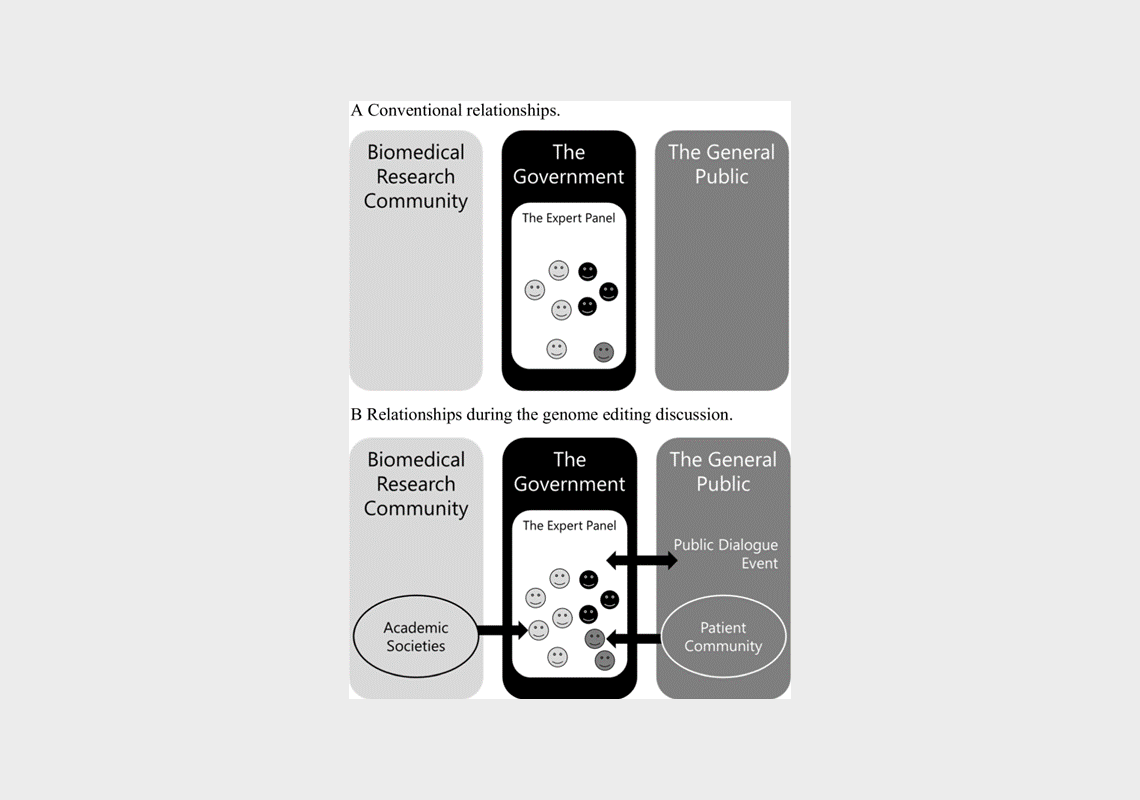Three stakeholders and their discussion forum
Researchers from OU identify the roles played by related research communities, the government, and the general public in the policy-making process by analyzing the discussions of research governance of human genome editing in Expert Panel on Bioethics
Osaka, Japan – A group of researchers at Osaka University analyzed discussions on research governance of human genome editing in the Expert Panel on Bioethics in Japan and identified the positive roles played by research communities, the government, and the general public in the policy-making process.
Genome editing is technology that can precisely and efficiently modify the genome of an organism. Human genome editing has significant potential in medical research and clinical applications, but it also entails technical risks and ethical, legal, and social issues (ELSI). Therefore, the issue of how genome editing should be used has been actively discussed. In particular, research communities, which primarily consist of the researchers themselves, have a strong interest in this issue and have held international forums for discussions. Attention has also been given to the potential for non-researchers to play an active role in genome editing discussions and the role of government agencies in research regulations. However, there have been no studies thus far that have comprehensively examined and descriptively identified the ways in which these stakeholders are involved in genome editing governance.
This research team focused on the Japanese Expert Panel on Bioethics, which is established within the Cabinet Office in Japan, to analyze how various stakeholders, including biomedical research communities, the government, and the general public, have been involved in the discussions of the research ethics review system and in the overall policy decision process for genome editing technologies. The study results revealed that various stakeholders, including experts, the general public, and patients, can be involved in the governance of emerging medical technologies, and that citizens are engaging in new initiatives, such as interactive events for the general public, in ways that differ from experts. Such involvement and initiatives were not found in the conventionalExpert Panel on Bioethics. Furthermore, the study found that government agencies and research communities can soundly fulfill their roles through collaboration with other stakeholders.
It is expected that the results of this study will provide more effective and practical guidance to countries and organizations seeking to work with diverse stakeholders in the governance of emerging medical technologies.
###
The article, “Stakeholder Involvement in the Governance of Human Genome Editing in Japan,” was published in Asian Bioethics Review at DOI: https://link.springer.com/article/10.1007/s41649-023-00251-8
About Osaka University
Osaka University was founded in 1931 as one of the seven imperial universities of Japan and is now one of Japan's leading comprehensive universities with a broad disciplinary spectrum. This strength is coupled with a singular drive for innovation that extends throughout the scientific process, from fundamental research to the creation of applied technology with positive economic impacts. Its commitment to innovation has been recognized in Japan and around the world, being named Japan's most innovative university in 2015 (Reuters 2015 Top 100) and one of the most innovative institutions in the world in 2017 (Innovative Universities and the Nature Index Innovation 2017). Now, Osaka University is leveraging its role as a Designated National University Corporation selected by the Ministry of Education, Culture, Sports, Science and Technology to contribute to innovation for human welfare, sustainable development of society, and social transformation.
Website: https://resou.osaka-u.ac.jp/en



